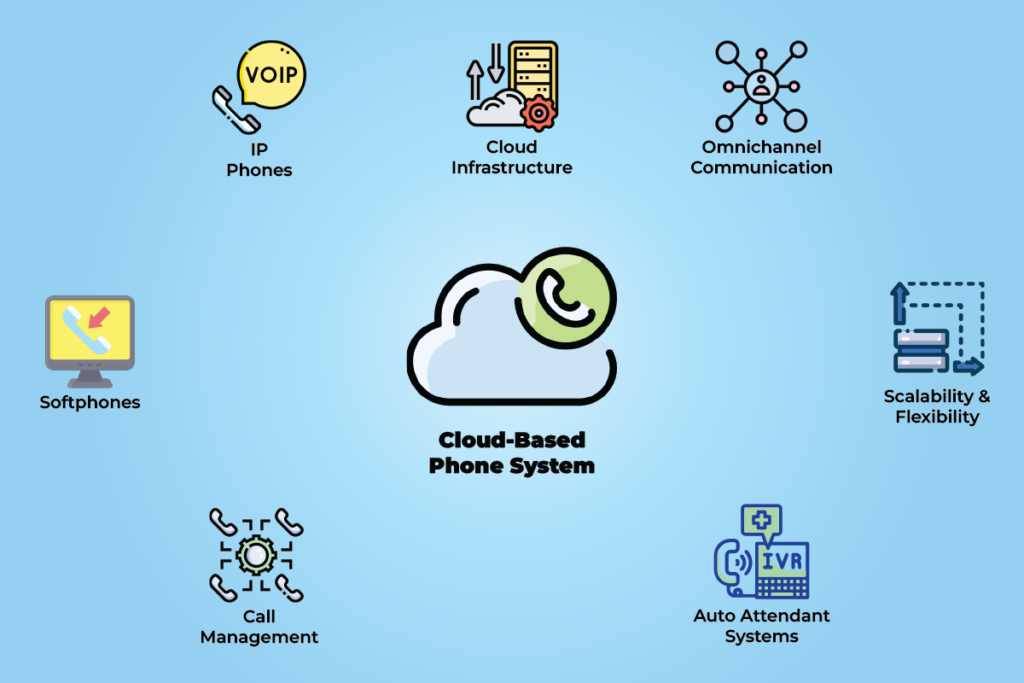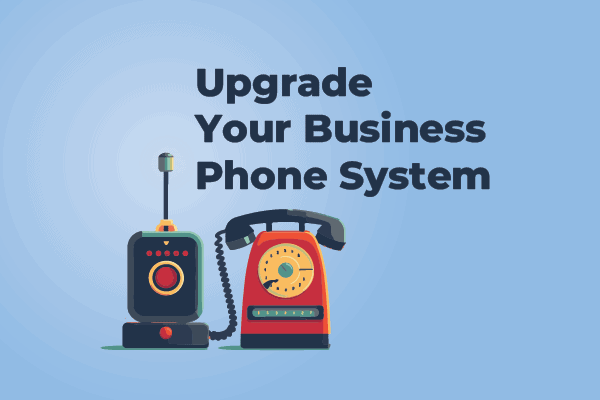The business environment is transforming at an accelerated pace, with digital technology at its heart. Today’s enterprises cannot afford to be left behind with outdated technology, particularly when it comes to communication. Hence, upgrading your business phone system is not just an option; it’s an essential step toward operational efficiency.
Your phone system is more than just a communication tool. It’s a connection between you and your customers, a facilitator for internal coordination, and a key player in ensuring seamless operations. In today’s digital era, it must be efficient, reliable, and agile.
The backbone of any successful business lies in its communication infrastructure. By upgrading your phone system with intelligent features and cutting-edge capabilities, you empower your organization to adapt, evolve, and conquer the challenges of tomorrow. – Christian Montes – Executive Vice President Client Operations @NobelBiz
Why Upgrade Your Business Phone System
Modern business phone systems, also known as VoIP (Voice over Internet Protocol), offer advantages that make them a worthy investment. Let’s delve into some of the key features and benefits that you can expect:
Enhanced features: Call recording, call forwarding, auto attendant, voicemail to email, and video conferencing are some of the advanced features that these systems offer.
Superior quality: With high-definition audio and video capabilities, modern systems provide excellent call quality.
Scalability: With cloud-based systems, you can easily scale your operations, adding or removing users per your business needs.
Cost-effectiveness: VoIP phone systems leverage your existing internet connection, eliminating the need for separate telephone wiring. This, coupled with low-cost international calls, makes it a cost-effective solution.
Improved Efficiency: Advanced features like call routing, automated attendants, and CRM integrations can streamline operations.
Things to consider before adopting a Better Phone System
Innovation never rests, and neither should your business. By upgrading your telecommunication system, you demonstrate a commitment to staying at the forefront of technology. Embrace the future, elevate your customer experience, and witness the transformative impact it has on your bottom line. – Christian Montes – Executive Vice President Client Operations @NobelBiz
1. Set Your Business Communication Goals
Consider the short and long-term communication goals of your business. These might include reducing costs, improving customer service, or facilitating remote work.
2. Evaluate Your Current System
Identify the weaknesses and strengths of your current phone system. What features do you wish you had? Which ones could you do without? Consider also how much you’re willing to spend on a new system.
3. Choose Your Preferred System Type
There are three main types of business phone systems:
- PBX (Private Branch Exchange)
- VoIP (Voice over Internet Protocol)
- Cloud-based systems
Each has its pros and cons, which we’ll discuss in the next section.
Choosing the Right System: PBX vs. VoIP vs. Cloud
In business communication, selecting the right phone system is a crucial decision that can significantly impact your organization’s efficiency and productivity. When considering your options, it’s important to understand the key differences between PBX (Private Branch Exchange), VoIP (Voice over Internet Protocol), and cloud-based systems. Next, we will dive into the intricacies of each solution, guiding you through choosing the ideal system that aligns with your business needs and unlocking a new realm of communication possibilities.
PBX Phone Systems
Private Branch Exchange (PBX) phone systems have revolutionized how businesses communicate, offering them a more efficient and flexible way of managing calls. But what exactly are these systems? A PBX phone system is a private telephone network used within a company. It allows for internal communication between departments and external communication with customers and stakeholders.
According to a report by MarketsandMarkets, the global PBX phone system market size is expected to grow from USD 5.49 billion in 2020 to USD 9.50 billion by 2025 at a Compound Annual Growth Rate (CAGR) of 11.6% during the forecast period.
Read this article to learn more about PBX and PBX vs. Cloud Telephony: What is the Best Solution for Call Centers?
 Pros of PBX Phone Systems
Pros of PBX Phone Systems
- Cost-Effectiveness
One of the major benefits of PBX phone systems is their cost-effectiveness. Traditional phone systems can be expensive, especially when making long-distance or international calls. With a PBX system, businesses can drastically reduce these costs. Pretty neat, right?
- Scalability
Next up is scalability. With a PBX phone system, expanding your business communication infrastructure is as easy as pie. You can add new lines or extensions without significant hardware changes as your business grows.
- Advanced Features
Ever dreamed of having a voicemail, call forwarding, conference calling, and auto-attendant features in one place? With a PBX system, all these and more become a reality, enhancing your business’s efficiency and customer service.
- Easy Integration
PBX phone systems can easily integrate with your existing business systems, including CRM software, enhancing workflow and customer service.
- Improved Customer Service
With features like call routing, call forwarding, and automated attendants, a PBX system can significantly improve customer service, ensuring that clients are attended to promptly and professionally.
 Cons of PBX Phone Systems
Cons of PBX Phone Systems
- Initial Setup Cost
While PBX systems are cost-effective in the long run, they may require a substantial initial investment. This might be a turn-off for small businesses or startups.
- Dependence on Internet Connection
PBX phone systems, especially the VoIP-based ones, are highly dependent on an Internet connection. This means that your communication may be affected in case of Internet downtime. A tad annoying.
- Maintenance and Updates
PBX phone systems require regular maintenance and updates like any other technological system. This could add to the operational costs and requires skilled personnel.
- Technical Complexity
While PBX phone systems offer a plethora of features, these can sometimes be complex to understand and use, especially for non-technical staff. A little challenging, perhaps?
In the fast-paced digital age, upgrading your phone system isn’t just a luxury—it’s a strategic necessity. The sooner you embrace the power of advanced communication technology, the faster you unlock unprecedented efficiency, seamless collaboration, and unparalleled customer satisfaction. – Christian Montes – Executive Vice President Client Operations @NobelBiz
VoIP Phone Systems
Voice over Internet Protocol (VoIP) is a revolutionary technology that enables users to make phone calls using a broadband internet connection instead of a conventional or analog phone line. This system translates your voice into a digital signal, allowing you to call directly from a computer, VoIP phone, or other data-driven devices.
 Pros of Voice Over IP
Pros of Voice Over IP
- Cost Efficiency
The primary advantage of VoIP is the potential for significant cost savings. Traditional phone calls rack up charges based on the duration of the call and the distance between the two parties. With VoIP, you’re utilizing your existing internet connection, resulting in much lower operational costs.
VoIP reduces startup costs by as much as 90%
The cost benefits of VoIP make it suitable for new businesses with budget constraints. Its cloud-based nature eliminates infrastructure costs associated with hardware-based communication systems. VoIP services help you scale up or down, depending on your company’s current needs. It also utilizes existing network lines and connected phones to access a wealth of call features at no additional cost.
(Source: Startupanz)
- Advanced Features
VoIP systems have advanced features like call forwarding, callback option, voicemail, caller ID, and call routing. These features can improve efficiency and communication within your business. But have you ever wished your phone system could do more? Then, VoIP could be your answer.
40% of customers trust the automated callback option
More customers are confident that businesses would call them back if they choose the automated callback option instead of waiting on hold. Meanwhile, the other 58% believe the callback option doesn’t work. Modern VoIP providers like 8×8 have callback functionalities, allowing callers to leave the queue and be called back when an agent becomes available.
(Source: Invoca)
 Cons of Voice Over IP
Cons of Voice Over IP
- Dependence on Internet Connection
Since VoIP depends on an internet connection, any interruption or slowdown in your internet service could negatively impact call quality or even result in dropped calls—something to ponder.
- Power Outages
In a power outage, traditional phone lines typically remain operational. However, a VoIP system could leave you incommunicado without a backup power supply. Can your business afford that risk?
- Latency and Jitter
Latency and jitter are issues inherently tied to digital communications. These problems can lead to echoes, choppy audio, or delayed communication. Sometimes, these glitches can turn a smooth conversation into a frustrating experience.
- Security Concerns
While VoIP providers take measures to secure their networks, VoIP systems are still vulnerable to the same risks as any internet-connected device, including malware, viruses, and hacking.
Cloud-based Phone Systems
Cloud-based systems are a type of VoIP system where the provider manages and maintains the technology. Cloud-based systems are essentially a network of servers hosted on the Internet that store, manage, and process data. They replace traditional on-premises servers, providing numerous potential benefits for businesses and individual users alike.

Simply put, a cloud-based phone system is a complete set of tools that can be deployed for any communication beyond voice. As we will see, a cloud phone system will integrate VoIP technology with other advanced communication tools.
According to Aberdeen Group, 90% of contact centers that switched to the cloud did so for financial flexibility.
How is a Cloud-based Phone System different from VoIP
Before we move forward to evaluating the cloud-based phone system, we must first clarify how they differ from a VoIP system. At first glance, they appear to be similar.
VoIP technology allows voice communication over the Internet, converting analog voice signals into digital data packets for transmission. It enables voice calls over IP networks, such as the Internet or private IP networks.
On the other hand, cloud telephony is a broader concept encompassing various communication services and features delivered through the cloud. Cloud telephony typically includes VoIP as a fundamental component but goes beyond voice calls. It can involve additional functionalities like call routing, call recording, voicemail, interactive voice response (IVR), and integration with other cloud-based applications.
In summary, VoIP specifically refers to the technology of transmitting voice calls over IP networks. In contrast, cloud telephony refers to a broader set of communication services and features delivered through the cloud, often including VoIP as a key component.
 The Pros of Cloud-based Phone Systems:
The Pros of Cloud-based Phone Systems:
According to a Zippia research from Feb. 23, 2023, “Cloud-based call centers report having 27% less downtime and Cloud-based call centers with 500 seats report saving an average of 43%.“
- Cost Effectiveness
One of the primary benefits of cloud-based systems is cost-effectiveness. Investing heavily in hardware, maintenance, or a large IT team is unnecessary. Instead, you pay for what you use, making it a scalable solution that can grow with your needs.
- Scalability
Speaking of scalability, cloud systems make scaling your operations up or down really easy. You can quickly add more storage or processing power without investing in additional physical infrastructure.
- Accessibility and Mobility
Another significant advantage of cloud systems is their accessibility. With your data stored in the cloud, you can access it from anywhere with an internet connection. This increases mobility and flexibility, especially in today’s remote work culture.
- Disaster Recovery
Cloud-based systems also offer robust disaster recovery capabilities. Since your data is stored in multiple locations in the cloud, you can recover it easily in case of a disaster or data loss.
 Cons of Cloud-based Phone Systems:
Cons of Cloud-based Phone Systems:
- Dependent on Internet Connection
As cloud-based systems depend on the Internet, any disruption to your internet service could leave you without access to your data and applications.
- Limitations in Customization
While cloud systems offer many customization options, they may not meet the unique needs of every organization. Depending on the provider and the system’s nature, there might be some limitations.
- Transition Difficulties
Transitioning to a cloud-based system can also be challenging. It can involve a significant amount of time, resources, and adjustment.
The Process of Upgrading Your Business Phone System
Switching from your old, traditional phone system to a state-of-the-art digital one may seem daunting, but it’s simpler than you think. Below, we outline a roadmap to guide you through this transition.
Remember, your phone system is more than just a means of communication—it’s a gateway to opportunity. A smart upgrade empowers your business to transcend geographical boundaries, connect with customers effortlessly, and drive growth through seamless, reliable, and feature-rich communication solutions. – Christian Montes – Executive Vice President Client Operations @NobelBiz
Step 1: Assess Your Current Needs
Every business has unique needs. Identify the features you need, the number of users, your budget, and your growth projections. This will help you select a system that aligns with your requirements.
Step 2: Explore Your Options
Research various VoIP providers. Look at the features they offer, their pricing, their reputation in the market, and the quality of their customer support.
Step 3: Install and Train
Once you’ve selected a provider, the next step is installation. Many providers offer professional installation services to ensure a smooth transition. Also, make sure to train your employees to use the new system effectively.
Step 4: Test and Optimize
After the system is installed, test its features and functionality thoroughly. Then, make necessary adjustments for optimum performance.
A Sneak Peek into the Future of Business Communication
The transformation doesn’t stop with just a phone system upgrade. The world of business communication is constantly evolving, with newer technologies and trends emerging. Let’s take a look at some of these future trends:
Integration of AI in Communication
Artificial Intelligence is making its way into every business sphere, and communication is no exception. AI can automate repetitive tasks, provide intelligent insights, and enhance customer interactions. This not only saves time but also enables personalized communication.
According to CX Today, 75% of companies that have migrated to the cloud say they’re more likely to trust new and innovative tools like AI.
Rise of Unified Communications
Unified Communications as a Service (UCaaS) is expected to become mainstream. It combines various communication channels into a single platform, such as voice, video, messaging, and file sharing. This offers better collaboration, efficiency, and productivity.
According to Precedence Research, the global unified communications market size was valued at US$ 89.58 billion in 2021, and it is expected to surpass around US$ 385.21 billion by 2030, with a remarkable CAGR of 18% from 2022 to 2030.
Enhanced Mobile Communication
With the growing trend of remote work and BYOD (Bring Your Own Device), mobile communication will play an even more significant role. Modern phone systems must seamlessly integrate with mobile devices, allowing employees to communicate effectively, regardless of location.
There’s no denying that switching to a modern phone system can be a significant leap for your business. However, the benefits outweigh the initial investment and effort involved. By offering advanced features, scalability, and cost-effectiveness, modern phone systems set the stage for seamless communication, efficient operations, and business growth.
It’s time to bid farewell to your outdated system and embrace the future of communication with a modern, dynamic, and feature-rich business phone system. Your business deserves nothing less!
 The Trailblazing Business Phone System from NobelBiz
The Trailblazing Business Phone System from NobelBiz
At Nobelbiz, we are a contact center software technology company providing carrier services and an omnichannel platform for call centers. We mainly serve clients in the US but offer our services worldwide.
NobelBiz OMNI+
The NobelBiz OMNI+ cloud call center solution is our software product designed to complement our carrier solution, taking it to new heights of performance. NobelBiz OMNI+ has unique capabilities: Omnichannel, built-in compliance tools, and fast implementation to simple cross-channel campaign setup and remote work. NobelBiz OMNI+ is a customizable powerhouse of productivity that can be deployed in just a few days. It also provides complete voice solutions thanks to our proprietary carrier-of-carriers network.
NobelBiz OMNI+ has an impressive array of options and functions that can be tweaked, bent, customized, and optimized to find the perfect use case for ANY call center:
Channel agnostic: From the classical voice calls, SMS, or email to the more novel social media chatting platforms such as Facebook Messenger, Twitter, WhatsApp, and more…
Impressive CRM and API integrations: Besides a couple of dozens of standard integrations with some of the most popular software solutions for call centers, our development and engineering teams are ready for the next integration based on your specific requirements.
Easy Work-From-Home capabilities: NobelBiz OMNI+ allows you to move entire teams of agents to a remote environment and back to the office in a few days with close to no workflow interruption.
The NobelBiz Voice Carrier Network
The NobelBiz Voice Carrier Network guarantees uptime with extraneous backup servers ready to kick in anytime. At NobelBiz, we believe that telco solutions should be purposefully built for call centers’ needs. That is why our telephony solution NobelBiz Voice Carrier is:
- Made specifically for the demands of the contact center sector.
- The market’s most sophisticated telecom network.
- Not a reseller but a unique carrier-of-carriers.
- Uniquely dependable infrastructure with several redundancies.
- In terms of cost-per-minute, the most competitive telecom service.
With NobelBiz Voice Carrier, you get:
- The Lowest cost-per-minute in the industry: When you call in a geographical region served by numerous carriers, our network will automatically route the call via the most cost-effective route, ensuring the lowest possible cost-per-minute every time you call.
- A Network designed for your call center needs: NobelBiz is not your typical telecom provider; it was created to serve contact centers worldwide. Every technological aspect is optimized for contact center activity: usability, compliance, price, etc.
- A Scalable and reliable Network: Our carrier-of-carriers network is likely one of the most modern options on the market, providing global coverage with built-in redundant servers and a 99.99% uptime guarantee across the board.
- A Trusted Supplier: NobelBiz has its clients’ best interests at heart, and we cherish trust above all else. As a result, we are one of the few telecom providers for contact centers that do not bind our clients to long-term commitments. Our business model also does not need minimum spending or early termination penalties.
Conclusion:
Remember, an upgraded phone system isn’t an expense; it’s an investment in your business’s future. Stay ahead of the curve by making the switch today. The future of business communication is here, and it’s more exciting than ever.
In this digital age, businesses need to adapt to stay competitive. Upgrading your phone system is a critical step toward this transformation. It not only enhances operational efficiency but also delivers a superior customer experience.

Michael McGuire is a contact center industry expert with almost two decades of experience in the space. His experience includes roles as Director of Contact Center Digital Transformation at NobelBiz, and as Director of Operations at FLS Connect, managing multiple call centers. As President of Anomaly Squared and Targeted Metrics, Michael successfully transitioned companies into remote operations and significantly boosted revenues. With a strong background in customer service, leadership, strategic planning, and operations management, Michael excels in driving growth and innovation in the call center space.
Mike is also a proud Board Member for R.E.A.C.H Trade Group, promoting consumer protection and satisfaction and Co-host of the Off Skripted Podcast – a show about Life, Call Centers and everything in between.







